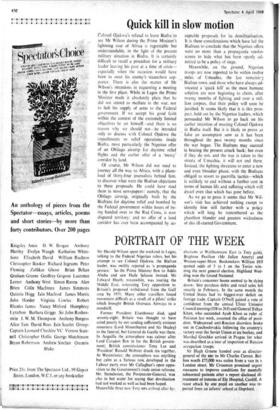Quick kill in slow motion
Colonel Ojukwu's refusal to leave Biafra to see Mr Wilson during the Prime Minister's lightning tour of Africa is regrettable but understandable, in the light of the present military situation in Biafra. It is certainly difficult to recall a precedent for a military leader leaving his post at a time of crisis— especially when the occasion would have been to meet his enemy's staunchest sup- porter. There is also the matter of Mr Wilson's intentions in requesting a meeting in the first place. While in Lagos the Prime Minister made it absolutely plain that he did not intend to mediate in the war, nor to halt his supply of arms to the Federal government. If we accept •his good faith within the context of the extremely limited objectives he set himself—and there is no reason why we should not—he intended only to discuss with Colonel Ojukwu the impediments to relief operations inside Biafra, most particularly the Nigerian offer of an Obilago airstrip for daytime relief flights and the earlier offer of a 'mercy' corridor by land.
Of course, Mr Wilson did not need to journey all the way to Africa, with a plane- load of thirty-four journalists behind him, to discover what were the Biafran objections to these proposals. He could have read them in most newspapers: namely, that the Obilago airstrip, originally built by the Biafrans for daytime relief and bombed by the Federal government within hours of be- ing handed over to the Red Cross, is now disputed territory: and no offer of a land corridor has ever been accompanied by ac- ceptable proposals for its demilitarisation. It is these considerations which have led the Biafrans to conclude that the Nigerian offers were no more than a propaganda smoke- screen to hide what has been openly ad- mitted to be a policy of siege.
Meanwhile, on the ground. Nigerian troops are now reported to be within twelve miles of Umuahia, the last remainir3 Biafran town, and those who have always ad- vocated a 'quick kill' as the most humane solution are now beginning to claim, after twenty months of fighting and over a mil- lion corpses, that their policy will soon be justified. It seems likely that it is this pros- pect. held out by the Nigerian leaders, which persuaded Mr Wilson to go back on his earlier intention of meeting Colonel Ojukwu in Biafra itself. But it is likely to prove as false an assumption now as it has been throughout the past twenty months since the war began. The Biafrans may succeed in beating the present attack back; but even if they do not, and the war is taken to the streets of Umuahia, it will not end there. Instead, the fighting threatens to enter a new and even bloodier phase, with the Biafrans obliged to resort to guerrilla tactics—which is unlikely to end without a further cost in terms of human Ilk and suffering which will dwarf even that which has gone before.
As we go to press it seems that Mr Wil- son's visit has achieved nothing except to identify him still further with a policy which will long be remembered as the ghastliest blunder and greatest wickedness of this ill-starred Government.


































 Previous page
Previous page